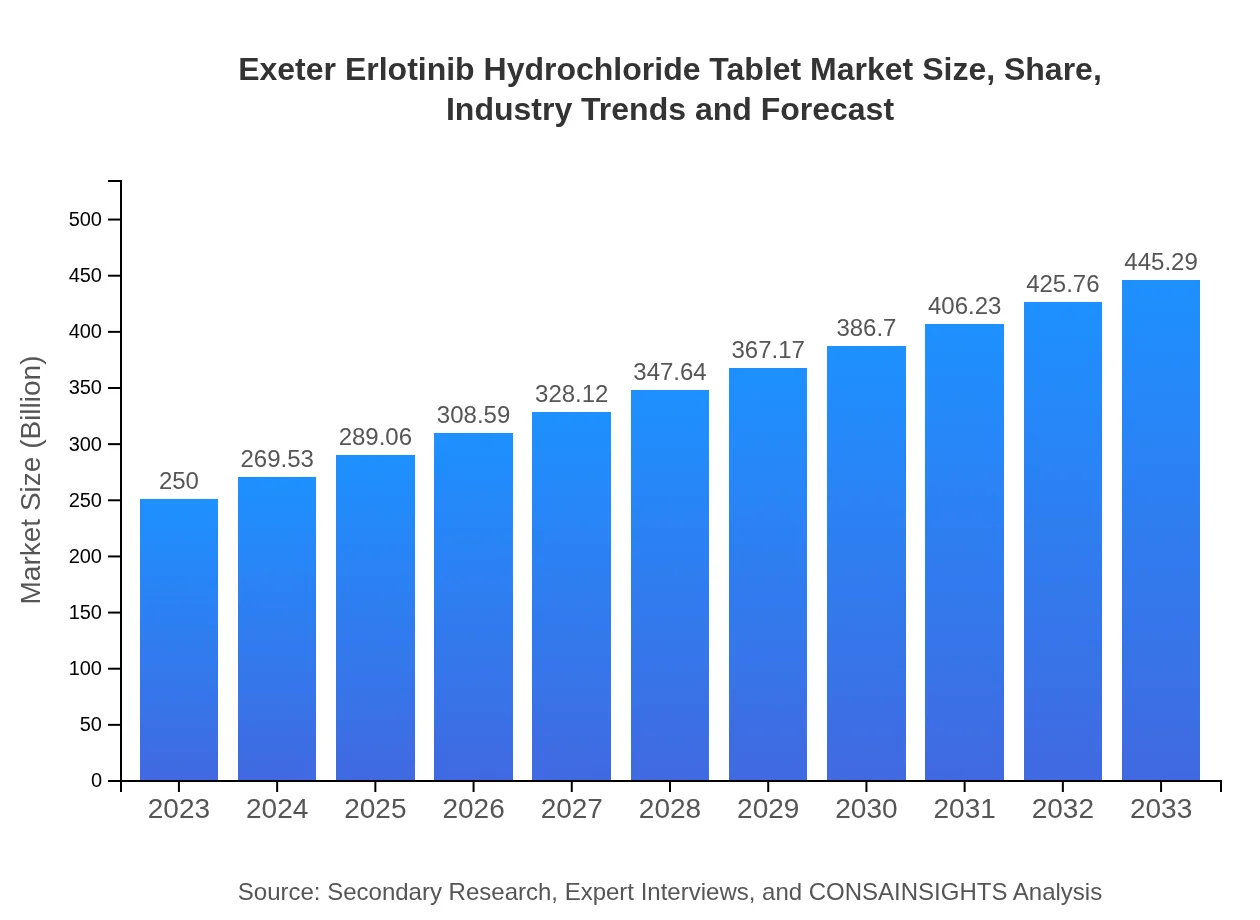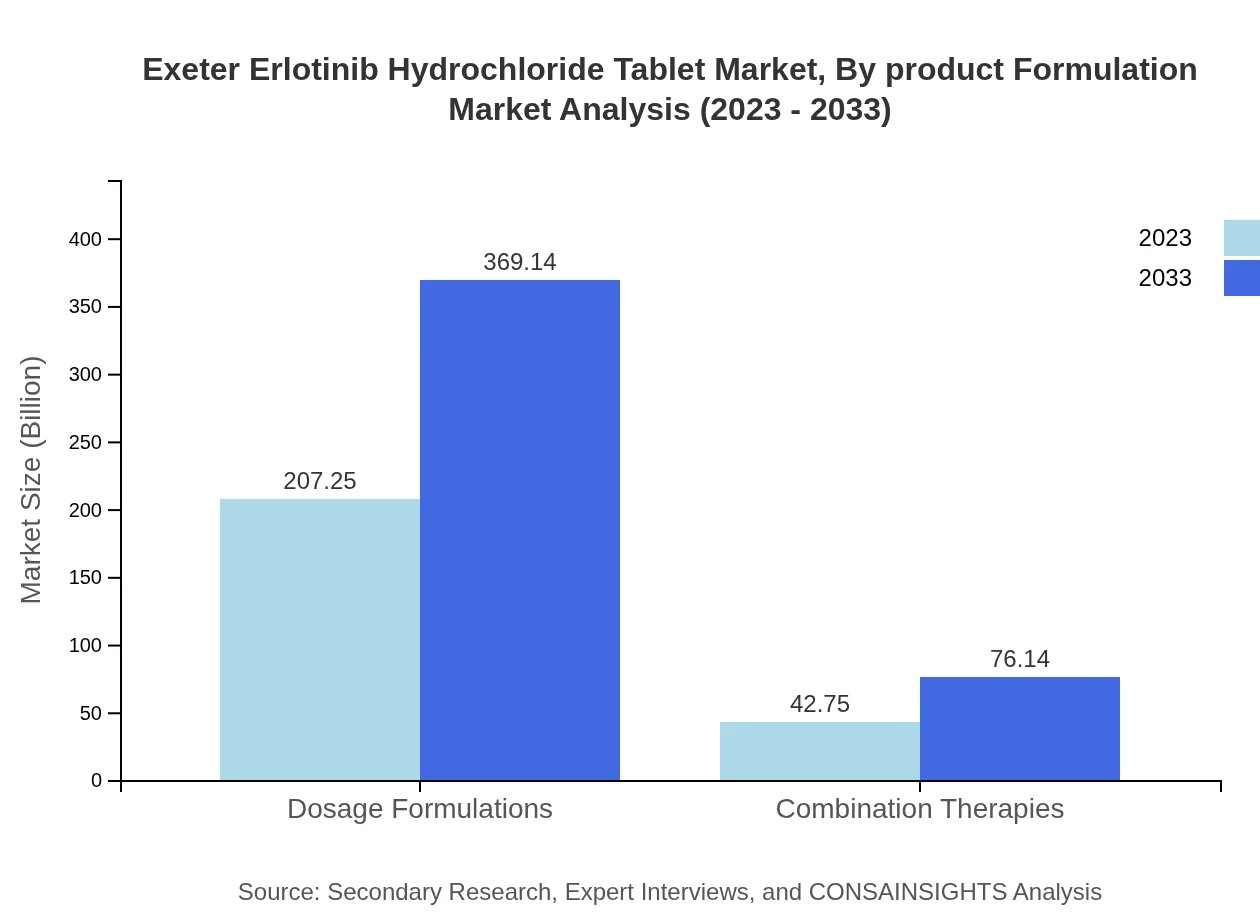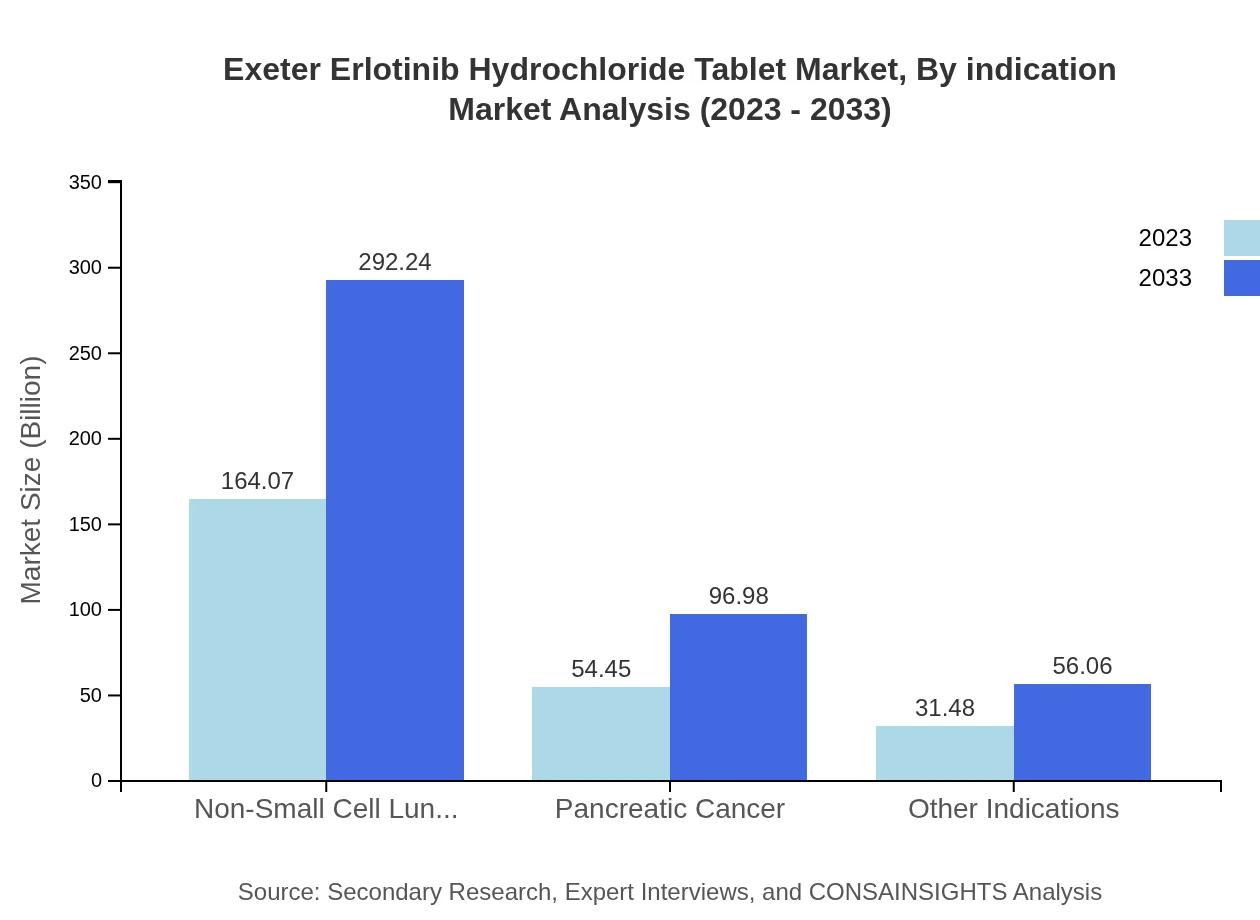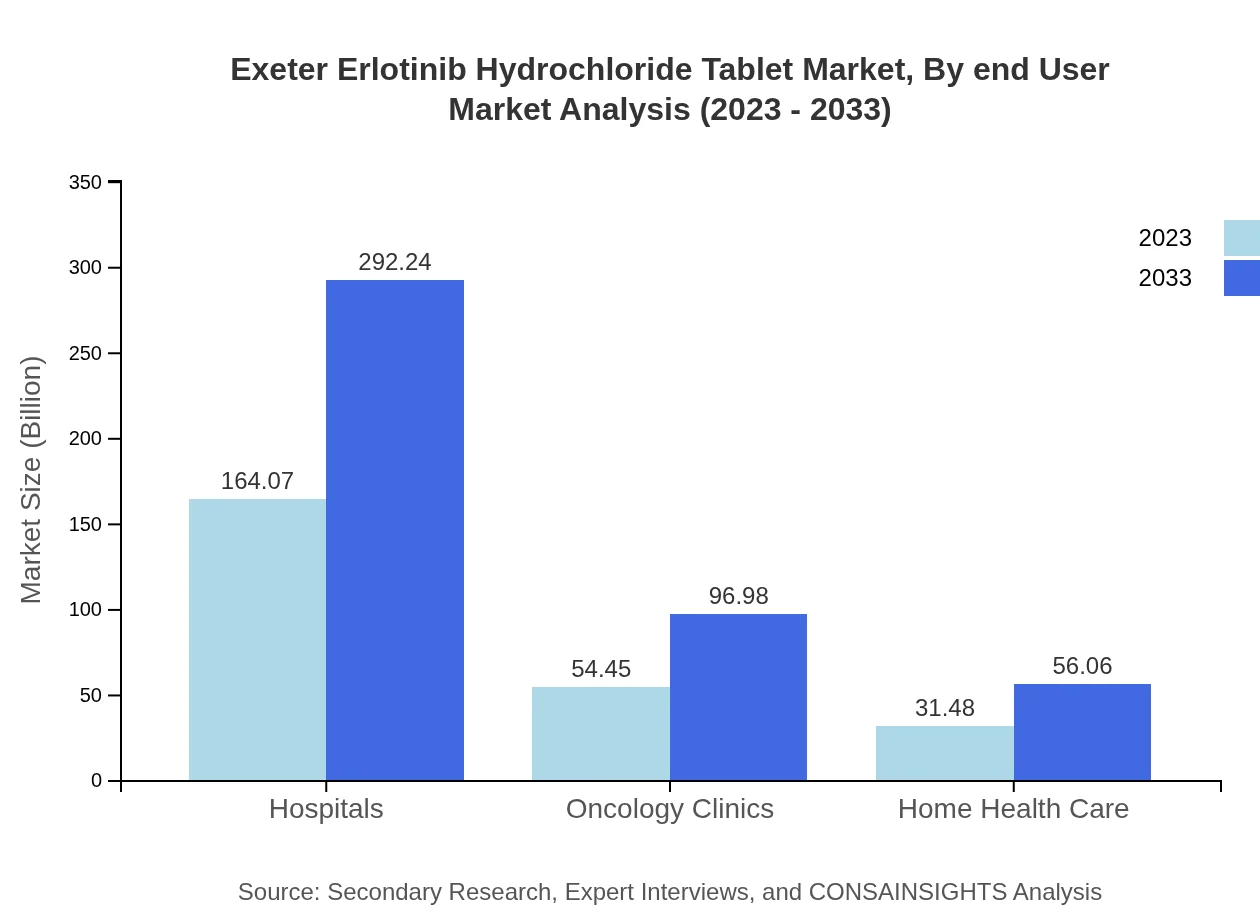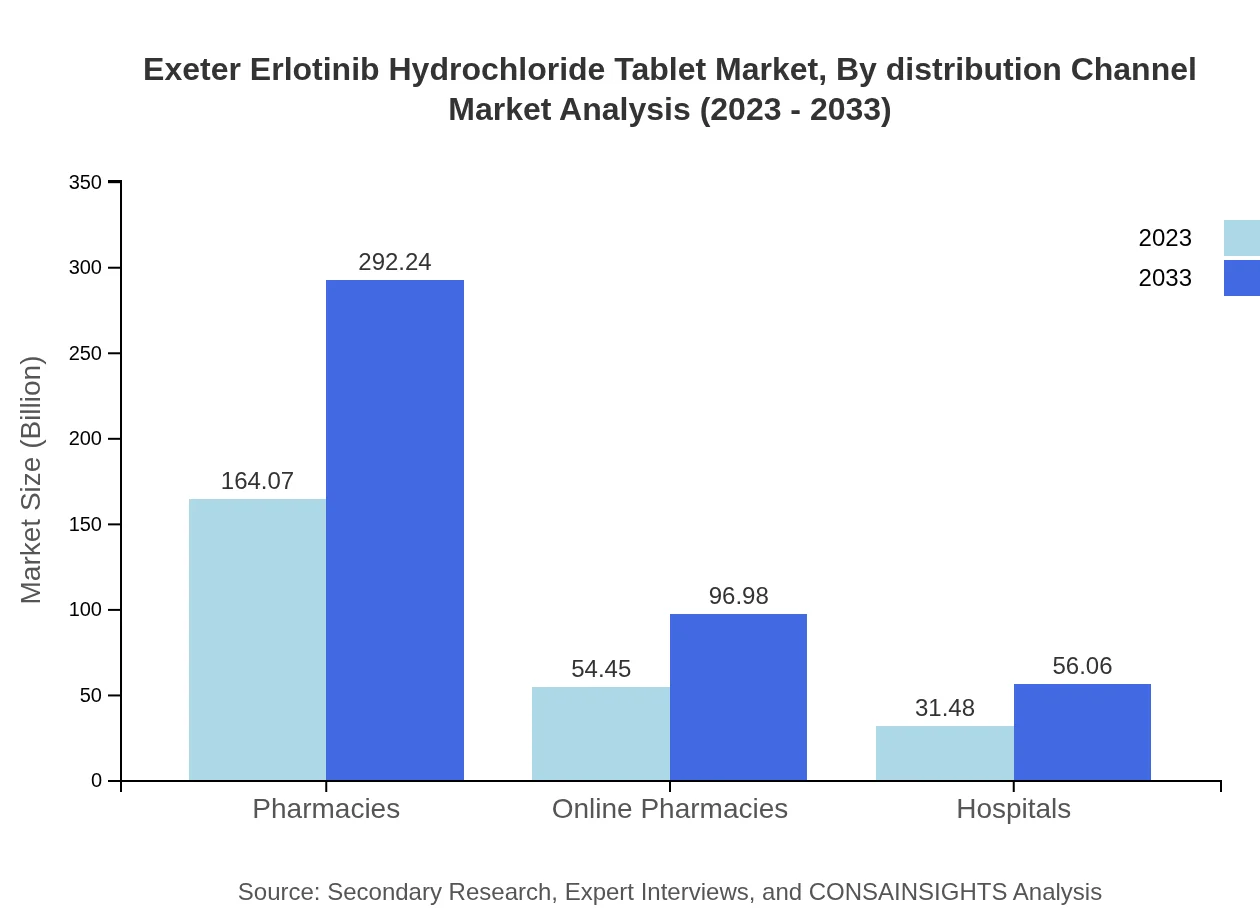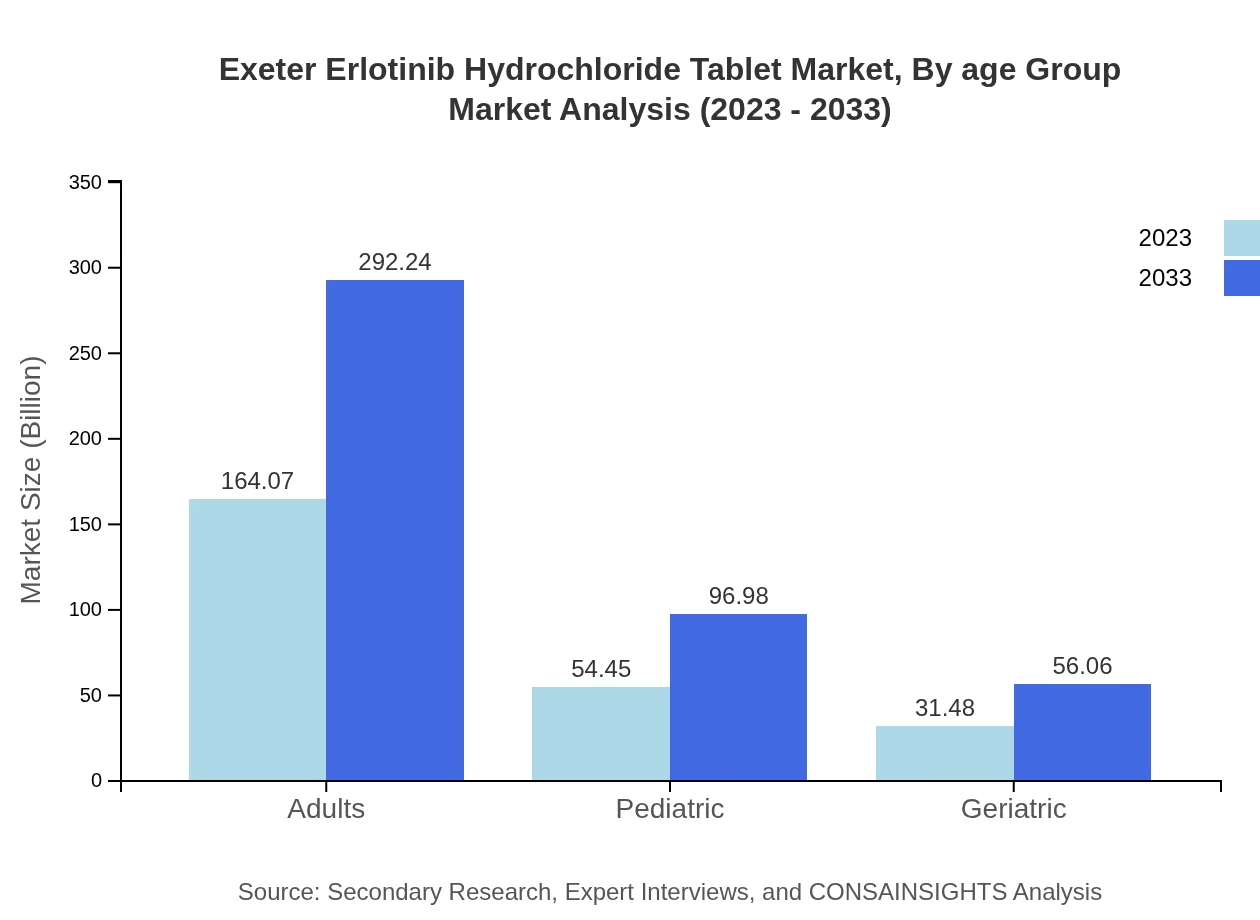Exeter Erlotinib Hydrochloride Tablet Market Report
Published Date: 31 January 2026 | Report Code: exeter-erlotinib-hydrochloride-tablet
Exeter Erlotinib Hydrochloride Tablet Market Size, Share, Industry Trends and Forecast to 2033
This report provides a comprehensive analysis of the Exeter Erlotinib Hydrochloride Tablet market, detailing insights into market trends, growth forecasts, and current industry conditions from 2023 to 2033.
| Metric | Value |
|---|---|
| Study Period | 2023 - 2033 |
| 2023 Market Size | $250.00 Million |
| CAGR (2023-2033) | 5.8% |
| 2033 Market Size | $445.29 Million |
| Top Companies | Roche, AstraZeneca, Novartis, Bristol-Myers Squibb |
| Last Modified Date | 31 January 2026 |
Exeter Erlotinib Hydrochloride Tablet Market Overview
Customize Exeter Erlotinib Hydrochloride Tablet Market Report market research report
- ✔ Get in-depth analysis of Exeter Erlotinib Hydrochloride Tablet market size, growth, and forecasts.
- ✔ Understand Exeter Erlotinib Hydrochloride Tablet's regional dynamics and industry-specific trends.
- ✔ Identify potential applications, end-user demand, and growth segments in Exeter Erlotinib Hydrochloride Tablet
What is the Market Size & CAGR of Exeter Erlotinib Hydrochloride Tablet market in 2023 and towards 2033?
Exeter Erlotinib Hydrochloride Tablet Industry Analysis
Exeter Erlotinib Hydrochloride Tablet Market Segmentation and Scope
Tell us your focus area and get a customized research report.
Exeter Erlotinib Hydrochloride Tablet Market Analysis Report by Region
Europe Exeter Erlotinib Hydrochloride Tablet Market Report:
In Europe, the market is anticipated to grow from $75.20 million in 2023 to $133.94 million by 2033. The presence of a well-established healthcare infrastructure and high investment in cancer research fortifies growth prospects in this region.Asia Pacific Exeter Erlotinib Hydrochloride Tablet Market Report:
The Asia Pacific region is projected to experience significant growth from $47.72 million in 2023 to $85.01 million by 2033, driven by increasing healthcare investments and a rising incidence of cancer. The growing middle class and improved access to healthcare facilities contribute to a more substantial market presence in countries like China and India.North America Exeter Erlotinib Hydrochloride Tablet Market Report:
North America remains one of the largest markets, with a valuation of $87.40 million in 2023, projected to grow to $155.67 million by 2033. The high prevalence of lung cancer, advanced healthcare facilities, and high patient expenditure catalyze robust growth in this region.South America Exeter Erlotinib Hydrochloride Tablet Market Report:
In South America, the market is expected to grow from $19.75 million in 2023 to $35.18 million by 2033. Factors such as government initiatives for disease awareness, alongside collaborations between local healthcare providers and international pharmaceutical companies, enhance the market landscape.Middle East & Africa Exeter Erlotinib Hydrochloride Tablet Market Report:
The Middle East and Africa market is set to expand from $19.92 million in 2023 to $35.49 million by 2033. Rising health awareness and improved access to cancer medications in urban areas are crucial factors propelling market growth.Tell us your focus area and get a customized research report.
Exeter Erlotinib Hydrochloride Tablet Market Analysis By Product Formulation
In 2023, the dosage formulations segment, including both oral tablets and combination therapies, holds a significant value. The market is anticipated to expand from $207.25 million in 2023 to $369.14 million by 2033. Combination therapies, representing a growing trend, are gaining traction due to their synergistic effects in improving treatment outcomes.
Exeter Erlotinib Hydrochloride Tablet Market Analysis By Indication
For indications, the Non-Small Cell Lung Cancer (NSCLC) segment dominates the market at $164.07 million in 2023, projected to reach $292.24 million in 2033. Other indications, such as pancreatic cancer, are vital but account for a smaller segment, with projections estimating $54.45 million initially and growing to $96.98 million over the forecast period.
Exeter Erlotinib Hydrochloride Tablet Market Analysis By End User
Hospitals remain the primary end-user segment, growing from $164.07 million in 2023 to $292.24 million by 2033. The demand in oncology clinics is also significant, reflecting a market increase from $54.45 million to $96.98 million over the same period. Home health care is emerging, leveraging telehealth solutions, with growth from $31.48 million to $56.06 million.
Exeter Erlotinib Hydrochloride Tablet Market Analysis By Distribution Channel
Distribution channels are segmented into pharmacies (both physical and online). In 2023, pharmacies account for a substantial share, valued at $164.07 million, growing to $292.24 million by 2033, while online pharmacies represent a growth niche, expanding from $54.45 million to $96.98 million, driven by increased consumer trust and technology adoption.
Exeter Erlotinib Hydrochloride Tablet Market Analysis By Age Group
Age group classifications indicate that adults comprise the majority of users, with a market value of $164.07 million in 2023 expected to grow to $292.24 million. The pediatric segment, while smaller, shows promise, moving from $54.45 million to $96.98 million, highlighting increased attention on tailored therapies for younger populations.
Exeter Erlotinib Hydrochloride Tablet Market Trends and Future Forecast
Tell us your focus area and get a customized research report.
Global Market Leaders and Top Companies in Exeter Erlotinib Hydrochloride Tablet Industry
Roche:
A leading player in oncology, Roche has significantly contributed to the development of targeted therapies, including Erlotinib, advancing treatment protocols in NSCLC.AstraZeneca:
AstraZeneca focuses on innovative cancer therapies, including combination treatments that enhance the efficacy of Erlotinib, thus improving patient outcomes.Novartis:
With robust pipelines for cancer treatment, Novartis contributes significantly to the oncology sector, including products based on Erlotinib.Bristol-Myers Squibb:
Bristol-Myers Squibb has a strong focus on immuno-oncology and other treatment modalities that support the use of Erlotinib in individual treatment plans.We're grateful to work with incredible clients.









FAQs
What is the market size of Exeter Erlotinib Hydrochloride Tablet?
The Exeter Erlotinib Hydrochloride Tablet market is projected to reach approximately $250 million by 2033, with a compound annual growth rate (CAGR) of 5.8% during the forecast period.
What are the key market players or companies in this Exeter Erlotinib Hydrochloride Tablet industry?
Key players in the Exeter Erlotinib Hydrochloride Tablet market include major pharmaceutical companies, biotechnology firms focused on oncology, and specialized drug manufacturers, all committed to advancing cancer treatment options.
What are the primary factors driving the growth in the Exeter Erlotinib Hydrochloride Tablet industry?
Growth in the Exeter Erlotinib Hydrochloride Tablet market is driven by increasing cancer prevalence, innovation in cancer therapies, advancements in drug formulations, and heightened investment in oncology-related research and development.
Which region is the fastest Growing in the Exeter Erlotinib Hydrochloride Tablet?
Asia Pacific is the fastest-growing region in the Exeter Erlotinib Hydrochloride Tablet market, projected to expand from $47.72 million in 2023 to $85.01 million by 2033, showcasing significant growth potential.
Does ConsaInsights provide customized market report data for the Exeter Erlotinib Hydrochloride Tablet industry?
Yes, ConsaInsights offers customized market report data tailored to the specific needs of clients in the Exeter Erlotinib Hydrochloride Tablet industry, providing insights relevant to individual market strategies.
What deliverables can I expect from this Exeter Erlotinib Hydrochloride Tablet market research project?
Deliverables from the Exeter Erlotinib Hydrochloride Tablet market research project include comprehensive market analysis reports, trend assessments, competitive landscape evaluations, and insights on growth opportunities across various segments.
What are the market trends of Exeter Erlotinib Hydrochloride Tablet?
Current market trends for Exeter Erlotinib Hydrochloride Tablets include the rise of targeted therapies, increasing use in combination treatment regimens, and the growing emphasis on personalized medicine and patient-centric approaches.

